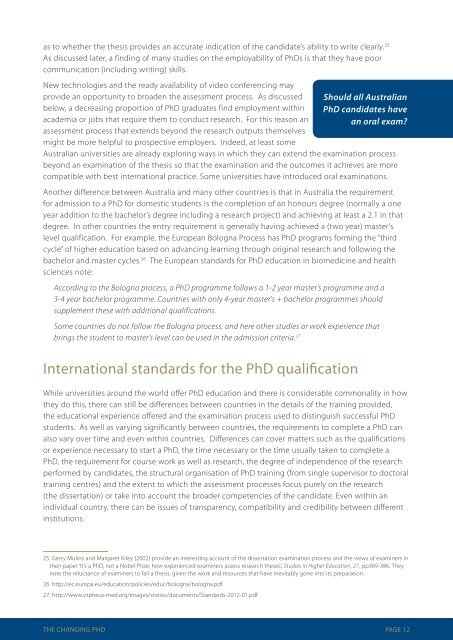the-changing-phd_final
the-changing-phd_final
the-changing-phd_final
Create successful ePaper yourself
Turn your PDF publications into a flip-book with our unique Google optimized e-Paper software.
as to whe<strong>the</strong>r <strong>the</strong> <strong>the</strong>sis provides an accurate indication of <strong>the</strong> candidate’s ability to write clearly. 25<br />
As discussed later, a finding of many studies on <strong>the</strong> employability of PhDs is that <strong>the</strong>y have poor<br />
communication (including writing) skills.<br />
New technologies and <strong>the</strong> ready availability of video conferencing may<br />
provide an opportunity to broaden <strong>the</strong> assessment process. As discussed Should all Australian<br />
below, a decreasing proportion of PhD graduates find employment within PhD candidates have<br />
academia or jobs that require <strong>the</strong>m to conduct research. For this reason an<br />
an oral exam?<br />
assessment process that extends beyond <strong>the</strong> research outputs <strong>the</strong>mselves<br />
might be more helpful to prospective employers. Indeed, at least some<br />
Australian universities are already exploring ways in which <strong>the</strong>y can extend <strong>the</strong> examination process<br />
beyond an examination of <strong>the</strong> <strong>the</strong>sis so that <strong>the</strong> examination and <strong>the</strong> outcomes it achieves are more<br />
compatible with best international practice. Some universities have introduced oral examinations.<br />
Ano<strong>the</strong>r difference between Australia and many o<strong>the</strong>r countries is that in Australia <strong>the</strong> requirement<br />
for admission to a PhD for domestic students is <strong>the</strong> completion of an honours degree (normally a one<br />
year addition to <strong>the</strong> bachelor’s degree including a research project) and achieving at least a 2.1 in that<br />
degree. In o<strong>the</strong>r countries <strong>the</strong> entry requirement is generally having achieved a (two year) master’s<br />
level qualification. For example, <strong>the</strong> European Bologna Process has PhD programs forming <strong>the</strong> “third<br />
cycle” of higher education based on advancing learning through original research and following <strong>the</strong><br />
bachelor and master cycles. 26 The European standards for PhD education in biomedicine and health<br />
sciences note:<br />
According to <strong>the</strong> Bologna process, a PhD programme follows a 1-2 year master’s programme and a<br />
3-4 year bachelor programme. Countries with only 4-year master's + bachelor programmes should<br />
supplement <strong>the</strong>se with additional qualifications.<br />
Some countries do not follow <strong>the</strong> Bologna process, and here o<strong>the</strong>r studies or work experience that<br />
brings <strong>the</strong> student to master’s level can be used in <strong>the</strong> admission criteria. 27<br />
International standards for <strong>the</strong> PhD qualification<br />
While universities around <strong>the</strong> world offer PhD education and <strong>the</strong>re is considerable commonality in how<br />
<strong>the</strong>y do this, <strong>the</strong>re can still be differences between countries in <strong>the</strong> details of <strong>the</strong> training provided,<br />
<strong>the</strong> educational experience offered and <strong>the</strong> examination process used to distinguish successful PhD<br />
students. As well as varying significantly between countries, <strong>the</strong> requirements to complete a PhD can<br />
also vary over time and even within countries. Differences can cover matters such as <strong>the</strong> qualifications<br />
or experience necessary to start a PhD, <strong>the</strong> time necessary or <strong>the</strong> time usually taken to complete a<br />
PhD, <strong>the</strong> requirement for course work as well as research, <strong>the</strong> degree of independence of <strong>the</strong> research<br />
performed by candidates, <strong>the</strong> structural organisation of PhD training (from single supervisor to doctoral<br />
training centres) and <strong>the</strong> extent to which <strong>the</strong> assessment processes focus purely on <strong>the</strong> research<br />
(<strong>the</strong> dissertation) or take into account <strong>the</strong> broader competencies of <strong>the</strong> candidate. Even within an<br />
individual country, <strong>the</strong>re can be issues of transparency, compatibility and credibility between different<br />
institutions.<br />
25. Gerry Mulins and Margaret Kiley (2002) provide an interesting account of <strong>the</strong> dissertation examination process and <strong>the</strong> views of examiners in<br />
<strong>the</strong>ir paper ‘It’s a PhD, not a Nobel Prize; how experienced examiners assess research <strong>the</strong>ses', Studies in Higher Education, 27, pp369-386. They<br />
note <strong>the</strong> reluctance of examiners to fail a <strong>the</strong>sis, given <strong>the</strong> work and resources that have inevitably gone into its preparation.<br />
26. http://ec.europa.eu/education/policies/educ/bologna/bologna.pdf<br />
27. http://www.orpheus-med.org/images/stories/documents/Standards-2012-01.pdf<br />
THE CHANGING PHD PAGE 12


